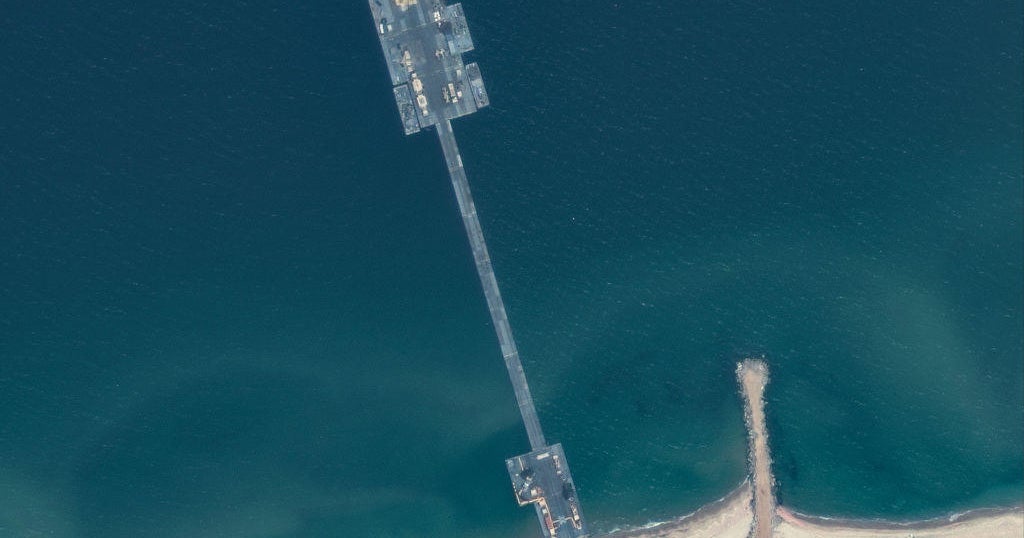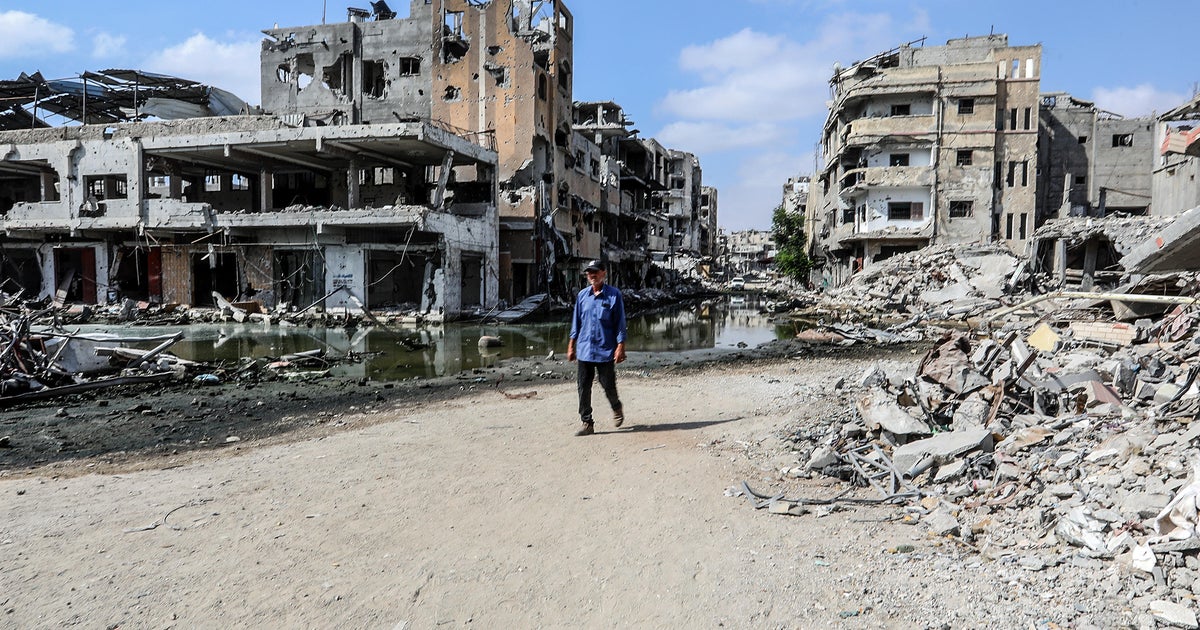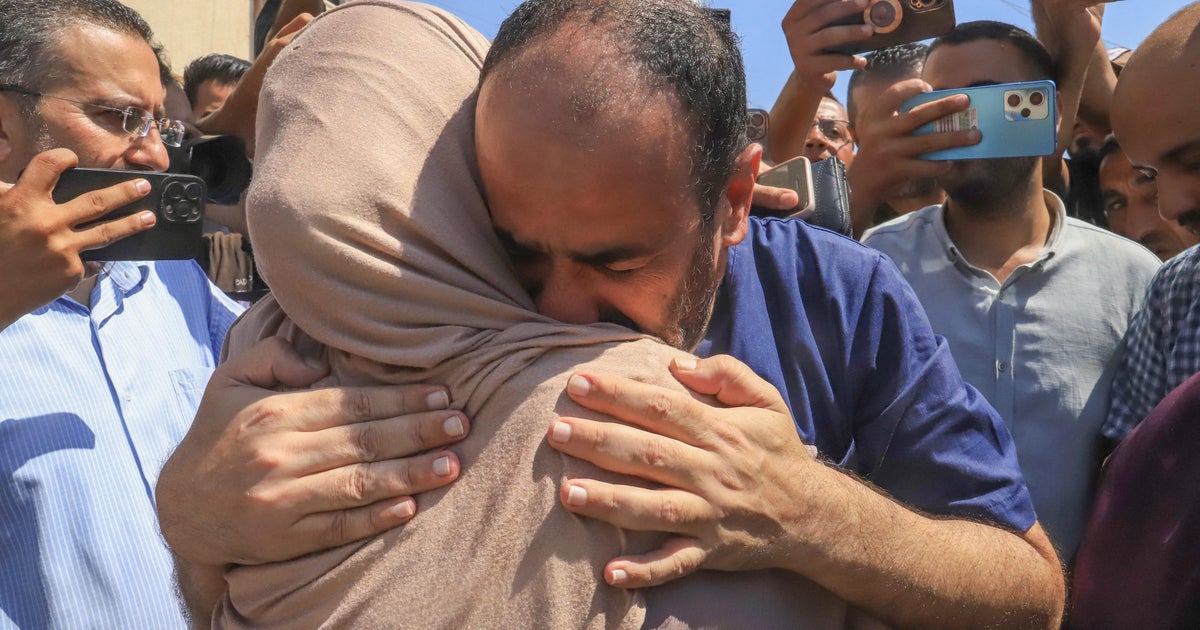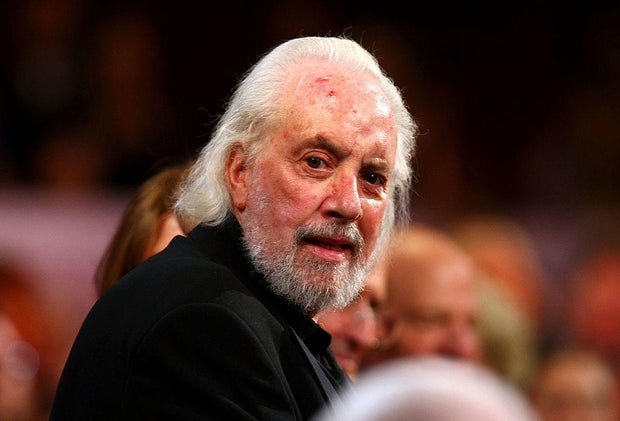CBS News
Gaza aid pier dismantled again due to weather, reinstallation date unknown

The pier built by the U.S. military to bring aid to Gaza has been removed due to weather, and the Pentagon is considering not re-installing it unless the aid begins flowing out into the population again, U.S. officials said Friday.
While the U.S. military has helped deliver desperately needed food through the pier, the vast majority of it is still sitting in an adjacent storage yard and that area is almost full. Aid agencies have had difficulty moving the food to areas further into Gaza where it is most needed because humanitarian convoys have come under attack.
The U.N., which has the widest reach in delivering aid to starving Palestinians, hasn’t been distributing food and other emergency supplies arriving through the pier since June 9. The pause came after the Israeli military used an area near the pier to fly out hostages after their rescue in a raid that killed more than 270 Palestinians, prompting a U.N. security review over concerns that aid workers’ safety and neutrality may be compromised.
U.N. World Food Program spokesman Steve Taravella said Friday that the U.N. participation in the pier project is still on pause pending resolution of the security concerns.
While the pier was meant to be temporary and was never touted as a solution to the challenges around getting humanitarian aid into Gaza, President Biden’s $230 million project has faced a series of setbacks since aid first rolled ashore May 17, and has been criticized by relief groups and congressional Republicans as a costly distraction.
The pier has been used to get more than 19.4 million pounds of food into Gaza, but has been stymied not only by aid pauses but unpredictable weather. Rough seas damaged the pier just days into its initial operations, forcing the military to remove it temporarily for repairs and then reinstall it. Heavy seas on Friday forced the military to remove it again and take it to the Israeli port at Ashdod.
Several U.S. officials, speaking on condition of anonymity to discuss military movements, said the military could reinstall the pier once the bad weather passes in the coming days, but the final decision on whether to reinstall it hasn’t been made.
Sabrina Singh, a Pentagon spokeswoman, acknowledged that she doesn’t know when the pier will be reinstalled.
“When the commander decides that it is the right time to reinstall that pier, we’ll keep you updated on that,” she said.
She also said Friday that there is a need for more aid to come into Cyprus and be transported to the pier. She noted that the secure area onshore is “pretty close to full,” but that the intention is still to get aid into Gaza by all means necessary. She said the U.S. is having discussions with the aid agencies about the distribution of the food.
But, she added, “of course, if there’s not enough room in the marshalling yard, then it doesn’t make sense to put our men or women out there when there’s nothing to do.”
Palestinians are facing widespread hunger after nearly nine months of fighting between Israel and Hamas war. Israeli restrictions on border crossings that are far more productive than the sea route and attacks on the aid convoys have severely limited the flow of food, medicine and other supplies.
CBS News
7/2: CBS Evening News – CBS News

Watch CBS News
Be the first to know
Get browser notifications for breaking news, live events, and exclusive reporting.
CBS News
Robert Towne, legendary Hollywood screenwriter of “Chinatown,” dies at 89

Robert Towne, the Oscar-winning screenplay writer of “Shampoo,” “The Last Detail” and other acclaimed films whose work on “Chinatown” became a model of the art form and helped define the jaded allure of his native Los Angeles, has died. He was 89.
Towne “passed away peacefully surrounded by his loving family” Monday at his home in Los Angeles, his publicist Carri McClure, told CBS News in a statement. She did not provide a cause of death.
In an industry which gave birth to rueful jokes about the writer’s status, Towne for a time held prestige comparable to the actors and directors he worked with. Through his friendships with two of the biggest stars of the 1960s and ’70s, Warren Beatty and Jack Nicholson, he wrote or co-wrote some of the signature films of an era when artists held an unusual level of creative control. The rare “auteur” among screen writers, Towne managed to bring a highly personal and influential vision of Los Angeles onto the screen.
Alberto E. Rodriguez/Getty Images for AFI
“It’s a city that’s so illusory,” Towne told The Associated Press in a 2006 interview. “It’s the westernmost west of America. It’s a sort of place of last resort. It’s a place where, in a word, people go to make their dreams come true. And they’re forever disappointed.”
Recognizable around Hollywood for his high forehead and full beard, Towne won an Academy Award for “Chinatown” and was nominated three other times, for “The Last Detail,” “Shampoo” and “Greystoke.” In 1997, he received a lifetime achievement award from the Writers Guild of America.
“His life, like the characters he created, was incisive, iconoclastic and entirely (original),” said “Shampoo” actor Lee Grant on X.
Towne was born Robert Bertram Schwartz in Los Angeles and moved to San Pedro after his father’s business, a dress shop, closed down because of the Great Depression. His father changed the family name to Towne.
Towne’s success came after a long stretch of working in television, including “The Man from U.N.C.L.E” and “The Lloyd Bridges Show,” and on low-budget movies for “B” producer Roger Corman. In a classic show business story, he owed his breakthrough in part to his psychiatrist, through whom he met Beatty, a fellow patient. As Beatty worked on “Bonnie and Clyde,” he brought in Towne for revisions of the Robert Benton-David Newman script and had him on the set while the movie was filmed in Texas.
Towne’s contributions were uncredited for “Bonnie and Clyde,” the landmark crime film released in 1967, and for years he was a favorite ghost writer. He helped out on “The Godfather,” “The Parallax View” and “Heaven Can Wait” among others and referred to himself as a “relief pitcher who could come in for an inning, not pitch the whole game.” But Towne was credited by name for Nicholson’s macho “The Last Detail” and Beatty’s sex comedy “Shampoo” and was immortalized by “Chinatown,” the 1974 thriller set during the Great Depression.
“Chinatown” was directed by Roman Polanski and starred Nicholson as J.J. “Jake” Gittes, a private detective asked to follow the husband of Evelyn Mulwray (played by Faye Dunaway). The husband is chief engineer of the Los Angeles Department of Water and Power and Gittes finds himself caught in a chaotic spiral of corruption and violence, embodied by Evelyn’s ruthless father, Noah Cross (John Huston).
Influenced by the fiction of Raymond Chandler, Towne resurrected the menace and mood of a classic Los Angeles film noir, but cast Gittes’ labyrinthine odyssey across a grander and more insidious portrait of Southern California. Clues accumulate into a timeless detective tale, and lead helplessly to tragedy, summed up by one of the most repeated lines in movie history, words of grim fatalism a devastated Gittes receives from his partner Lawrence Walsh (Joe Mantell): “Forget it, Jake, it’s Chinatown.”
The back story of “Chinatown” has itself become a kind of detective story, explored in producer Robert Evans’ memoir, “The Kid Stays in the Picture”; in Peter Biskind’s “East Riders, Raging Bulls,” a history of 1960s-1970s Hollywood, and in Sam Wasson’s “The Big Goodbye,” dedicated entirely to “Chinatown.” In “The Big Goodbye,” published in 2020, Wasson alleged that Towne was helped extensively by a ghost writer — former college roommate Edward Taylor. According to “The Big Goodbye,” for which Towne declined to be interviewed, Taylor did not ask for credit on the film because his “friendship with Robert” mattered more.
The studios assumed more power after the mid-1970s and Towne’s standing declined. His own efforts at directing, including “Personal Best” and “Tequila Sunrise,” had mixed results. “The Two Jakes,” the long-awaited sequel to “Chinatown,” was a commercial and critical disappointment when released in 1990 and led to a temporary estrangement between Towne and Nicholson.
Around the same time, he agreed to work on a movie far removed from the art-house aspirations of the ’70s, the Don Simpson-Jerry Bruckheimer production “Days of Thunder,” starring Tom Cruise as a race car driver and Robert Duvall as his crew chief. The 1990 movie was famously over budget and mostly panned, although its admirers include Quentin Tarantino and countless racing fans. And Towne’s script popularized an expression used by Duvall after Cruise complains another car slammed him: “He didn’t slam into you, he didn’t bump you, he didn’t nudge you. He rubbed you.
“And rubbin,′ son, is racin.'”
Towne later worked with Cruise on “The Firm” and the first two “Mission: Impossible” movies. His most recent film was “Ask the Dust,” a Los Angeles story he wrote and directed that came out in 2006. Towne was married twice, the second time to Luisa Gaule, and had two children. His brother, Roger Towne, also wrote screenplays, his credits include “The Natural.”
CBS News
Analyzing impact of Supreme Court’s Trump immunity decision

Watch CBS News
Be the first to know
Get browser notifications for breaking news, live events, and exclusive reporting.









